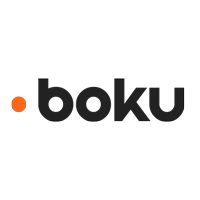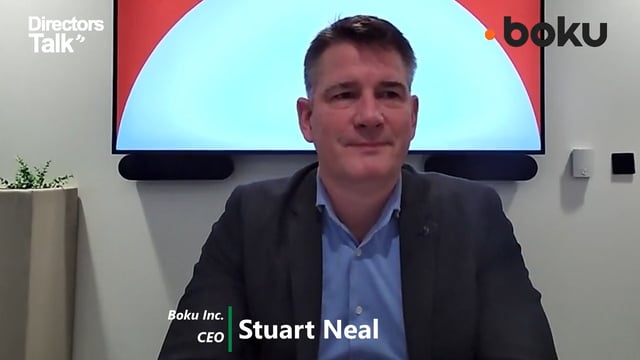Boku Inc (LON:BOKU) Chief Executive Officer Jon Prideaux caught up with DirectorsTalk for an exclusive interview to discuss their continued growth in 2017, the 45 new account connections, increased monthly active users and strategy & growth for 2018.
Q1: First off, congratulations on your continued growth in 2017 and in line with market expectations. Jon, can you talk us through the highlights?
A1: Yes, we’re very pleased with the results ourselves clearly it was only relatively recently that we came to the market and so, we obviously had expectations on our shoulders. So, I was pleased to be able to deliver to the market revenue of $24.4 million which was up 42% on the previous year and on a slightly reducing cost base leading to EBITDA losses at $2.3 million in comparison to 2016’s $12.3 million so a whopping 81% improvement which we’re pretty pleased about.
Going forward, we are now EBITDA positive on a month to month basis, we had a gross cash of something like $20 million in the bank at the end of the year, so we look forward to 2018 with considerable optimism.
Q2: You acquired 45 new Boku account connections for major customers, can you tell us a bit more about who these organisations are?
A2: The job that we do for our big customers is really helping them to acquire new users and we do that for frankly some of the world’s largest digital brands so that would include companies like Apple Inc (NASDAQ:AAPL), Sony (NYSE:SNE), Spotify (NYSE:SPOT), Microsoft (NASDAQ:MSFT), Netflix (NASDAQ:NFLX), Facebook (NASDAQ:FB).
These companies come to us because it just turns out that it’s a heck of a lot easier to be able to buy things on your mobile phone using your phone number, it’s a number that you know and generally we can figure out what the number is automatically. So, that convenience is really what means more people go through and complete a transaction and that’s the sort of service that our customers come to us in order to be able to acquire these new users.
From Boku’s perspective, 45 new connections in 2017 was about 60% up on where we were in the previous year, but it needs to be put in the context that we have a pipeline of somewhere in the order of 100 new connections that we are working on in various stages of implementation to take us through into the future.
So, we’re pleased with progress that we’ve had to date but also, as I say, look forward to the future with considerable optimism.
Q3: Now, Boku has had an increase in monthly active users to 8.1 million, an increase of 241%, can you expand on that for us?
A3: That’s obviously the bedrock of what we do and, as I’ve mentioned previously, what our customers come to us for is to help them to acquire new paying users and so, to hit 8.1 million in December 2017 representing, as you correctly say, a growth of 241% is something that we’re particularly pleased about and I think our customers also value that as being new users coming on to the platform.
What’s happened since then, which we’re also able to announce at this time, is if you now roll the tape forward for another 3 months and look at the situation at the end of March this year, 2018, that figure has increased by a further 1.1 million, up to 9.2 million active users in March 2018. If you translate that into sales value process, we’re also seeing it exceeding through there as well in that the total process volume in Q1 was just north of $727 million so we were lucky enough to pick up in 2018 where 2017 left off so we’re pleased about that.
Q4: What does your strategy as a group look like for the next 12 months?
A4: I think the core underpinning of Boku’s approach has been about size and that’s really reflecting the fact that scale is an important quality to have if you’re in the payments business. The reason for that is the cost of the payment platform are somehow broadly fixed and therefore the more transactions that you can pump through the system, the lower the cost per transaction, the lower your cost per dollar process is.
So, Boku having its size and scale now finds itself in the position where it has the lowest costs in the industry measured on a per dollar or per transaction basis. At the same time, we are also the company that has the biggest cost base allowing us to have the widest possible level of function so allows us to support the requirements of more merchants and this somehow feeds on itself. More functions equal more merchants, more merchants equal more transactions and in turn that leads to lower unit costs. This is the virtuous circle we’ve been pursuing for some time now and the one that we will continue to expect to pursue both through the next 12 months and on into the future.
Looking more broadly, we’re also looking to try to move away from just aggregating the billing systems of our carrier partners, at the moment that’s the service we provide to our customers and it’s a great way of helping them acquire new users. You already provide information to your carrier about who you are and where you live, and wouldn’t it be great if we could use that information also to transform registration for other goods and services? This would be to help you validate your identity in front of financial institutions rather than having to fish around in your filing cabinet for that electricity bill that you probably didn’t hold on to.
So, we’re really looking to try to come up with new products in the area of authentication and verification and really to try and transform the registration process to make it a lot simpler, leveraging on the existing connections we have with carriers.
So, more scale and new products, that’s our strategy for this year and beyond.
Q5: You’ve already touched on trading so far in 2018 but how well positioned is Boku for further growth this year?
A5: You’re right, I probably have covered a few of these things but broadly speaking, we’ve kicked off 2018 reasonably well, the trading has been in line with expectations, we have a good pipeline of new connections for us to go away and integrate.
We are looking forward to continuing our existing growth trajectory in line with expectations, the market has great expectations for us and we think as a management that we’re confident in being able to deliver on those expectations in 2018.









































